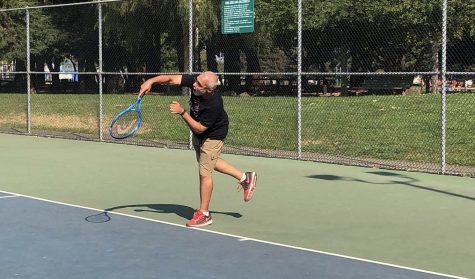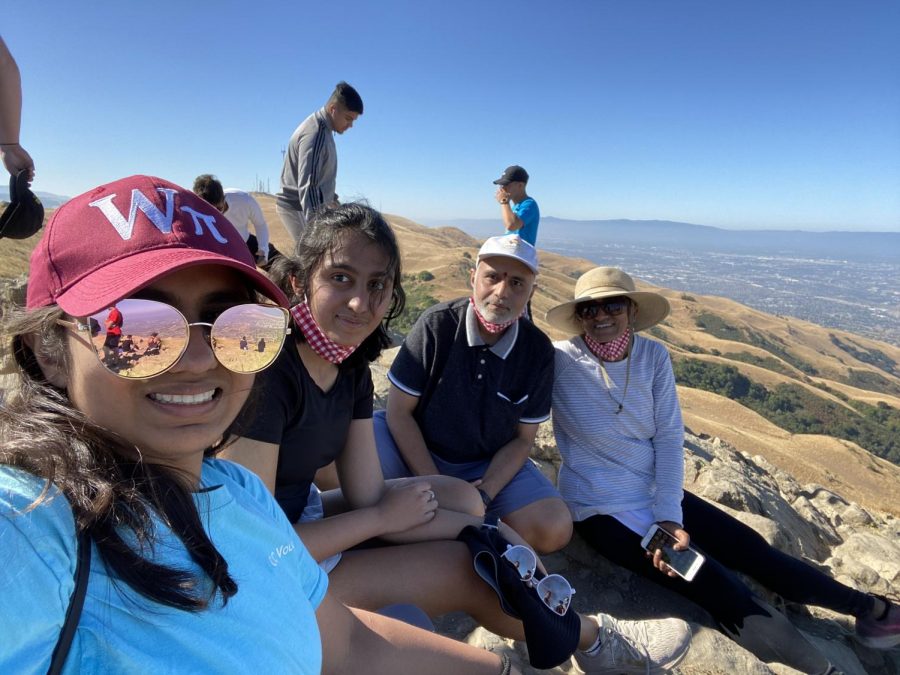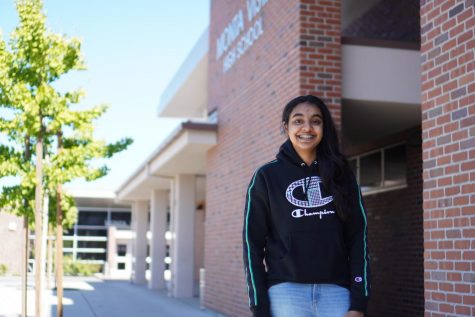Family bonding during shelter-in-place
Exploring how quarantine brought a family closer together
From left to right, Sriranjani, Vidhya and Venkatesan pose for a photo. Photo by Sriranjani Kalimani // Used with permission
September 12, 2020
Activewear? Check.
Water bottles? Check.
Rackets? Check.
Since the start of quarantine in March, junior Vidhya Kalimani has become accustomed to waking up and seeing the hour hand of the clock between 5 and 6 a.m. Every weekend, she and her family have played tennis together, waking up early to ensure they have an empty court to play at. After drinking coffee, Vidhya, along with her older sister Sriranjani Kalimani, 21, and her father Kalimani Venkatesan, 47, drive to Memorial Park. They try to arrive as close to the park’s opening as possible — around 6 a.m. Sometimes, though, the courts at Memorial Park are already full, so Vidhya and her family have to make their way to Serra Park.
Venkatesan describes the search for a tennis court as “the fun part.” He remembers a time he had to come back home without playing after driving back and forth between Memorial and Serra Park, searching unsuccessfully for a court. For Venkatesan, tennis is important because he values physical fitness, especially now with online learning and work.
“We are glued to the monitors and chairs and we spend countless hours confined to walking inside our houses,” Venkatesan said. “It’s important to keep [ourselves] fit physically and mentally. Tennis can give us that and it is something new, so learning something new always stimulates us.”

For Vidhya, tennis has allowed her to learn more about her family’s history. For example, she discovered her great-grandfather used to be a professional tennis player in India. Being related to an athlete inspires Vidhya because most of her family members have careers in STEM. Likewise, Venkatesan has also learned more about his daughter while playing tennis with her; specifically, he has witnessed her dedication to improvement.
The first day Vidhya played, she recalls hitting three balls so far out of the court that she couldn’t find them afterwards. Now, Vidhya and her older sister Sriranjani are able to rally, hitting the ball back and forth multiple times without it going out of bounds. Sriranjani cites learning to rally as one of her favorite memories of playing tennis because it shows how much she has progressed.
Vidhya and Sriranjani were also able to bond during shelter-in-place by getting their permits over the summer. As part of her drivers ed course, Vidhya watched simulations of how a car would react to certain actions, and she purposely changed the simulations so the car would crash. A memorable moment for Vidhya is laughing about these failed simulations with her sister. Getting her permit was special for Sriranjani too, and she notes how the difference in her and Vidhya’s driving styles contributed to her learning experience.
“When we started driving, that was really fun because we would take turns,” Sriranjani said. “So if we had to go to the supermarket, I would drive there and she would drive back. It was not that competitive, but we would still make fun of each other for all the stupid mistakes we made. I was always kind of careless about the little things and she was a lot more of a cautious driver than me.”
Like Sriranjani, Vidhya has also become closer to family members through shared pastimes. She says that by having conversations with her dad about family history and culture, they have built a closer relationship.
“We don’t get to meet our friends or anybody else face to face so connecting with the people you see every day is important,” Vidhya said. “Otherwise, you’re going to be very secluded and you’re going to get sad from being alone in your room. You [have] to build the connection.”
Whether it be playing tennis or driving, Venkatesan agrees with Vidhya and stresses the importance of spending time with family.
“Even though we are at home, we may not be together,” Venkatesan said. “Vidhya could be online with friends and I could be doing work. And we could pass each other like ships by the night, each of us not knowing what the heck we’re doing, unless we have some shared activity.”
As a college student, Sriranjani does not get to spend a lot of time with her family. Since she spent her summers working, she would only spend around two weeks at home.
“You want to be close to your support system, the people that you’re comfortable with, that you love and you can actually do fun things [with],” Sriranjani said. “For a lot of people, shelter-in-place might aggravate your anxieties, but I think that family time could definitely bring you closer [and] definitely can ground you a little bit more. I think if I was alone, I might have been a lot more stressed out. I’ve heard of people [whose family] get on their nerves all the time, but not for me. It was a really positive time.”




























